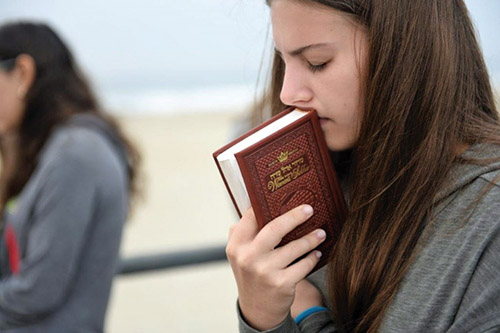

From the moment young children excitedly receive their very first siddur, as parents look on with pride and joy, prayer is a permanent part of their life. Yet somewhere between that first siddur and the routine recitation of daily prayers, the passion for praying can wane. A recent, eye-opening survey conducted by Nishma Research showed that more than 60 percent of Modern Orthodox Jews under age 45 don’t find prayer meaningful.
In response to this critical problem, Rabbi Zev Schostak launched Legacy 613, a tefillah education initiative to make prayer more powerful and inspirational to today’s generation. Working with yeshiva day schools across the US, Legacy 613 strives to arm Orthodox teens with the necessary tools to make tefillah a fulfilling lifelong experience.
Rabbi Schostak’s appreciation of the role of prayer was intensified by serving for nearly 30 years as director of pastoral care at Gurwin Jewish Nursing and Rehabilitation Center in Commack, New York, following a distinguished career as a teacher and principal at yeshiva elementary and high schools in New York and Michigan.
Rabbi Dr. Jay Goldmintz, director of education for Legacy 613, served in various capacities at Ramaz School for over 30 years and currently teaches in Ma’ayanot Yeshiva High School in Teaneck, New Jersey. He is the author of the Koren Ani Tefillah Weekday and Shabbat Siddurim. Primarily intended to engage high schoolers, the prayer books proved popular with adults as well; the weekday siddur won the National Jewish Book Award in 2014.
“I believe that the time has finally come for tefillah to be a field of education in its own right,” said Rabbi Goldmintz. “Jewish education became extraordinarily professional during the past decades when it came to teaching texts; we are finally coming around to realizing that we need to spend more time teaching souls as well.”
Legacy 613 assists educators in implementing practical and impactful tefillah education, optimized for each school’s particular needs, capabilities and student population. School-appointed tefillah coordinators help develop inspirational programming and special projects, with research, funding and guidance provided by the organization.
The initiatives are wide-ranging. While some schools have established explanatory and alternative minyanim, others have developed art-based or multi-media projects. “It doesn’t mean stopping everything and running a course in tefillah education,” explained Rabbi Goldmintz. “It does, however, mean trying to find teaching opportunities along the way. It means taking your creative juices and finding opportunities within things that you’re already doing. What we’ve been trying to do is help educators think much more consciously, deliberately and developmentally about what tefillah means to students at different ages and how we can help them find meaning within tefillah.”
For Rabbi Shraga Gross, Legacy 613’s director of school and community services, the goal is to “ignite the ‘Pintele Yid’ inherent within every Yiddishe Neshamah and to nurture that flame to connect to the Ribono Shel Olam through the medium of tefillah.” A veteran principal of day schools across the country, including the Rabbi Pesach Raymon Yeshiva in Edison, New Jersey, he feels passionately about the mission and its success. “During my visits to the Legacy schools, I have had the privilege of interacting with many students who truly yearn for greater spirituality and strive to connect with Hashem through tefillah.”
Chaya Sara Bodek, former student at SKA High School, shared some of the lessons that impacted her. “We all feel so connected to our phones, and in the workshops, Mrs. Kaminetsky [director of religious guidance] asked us to imagine feeling that same way about connecting to God. So when we lose our phones, we get so frantic and we think, ‘Where’s my phone, where’s my phone, where is it?’ What if we would feel that way constantly towards God—where’s God and why don’t I feel like He is in my back pocket or in my pocketbook; why are we not constantly checking on Him, talking to Him, texting Him?”
“Having these types of workshops that focused on individual prayers really transformed the way that I look at tefillah and the way I relate to and connect to God on a day-to-day basis,” shared Bodek. “We all have those times we feel alone and there’s no one there for us, but once we realize that God is always there and that He’s always listening to us and wants us to cry out to Him, and vent to Him when things are good and when things are bad, it could really change our lives.”
Legacy 613 programs are receiving much positive feedback from educators, administrators and students, and there are big plans for the future. “Going forward, we want to take the lessons we have learned—the successful programming concepts and resources—and ‘bring the schools into the shuls’ to educate and inspire Jews everywhere,” said Rabbi Gross. “By creating this synergy between school, shul and community, we hope to impact the lives of our children—he bright future of Am Yisrael—in an even more significant way.”
To find out more about Legacy 613 and its mission, visit http://legacy613.org/.
By Tammy Mark










